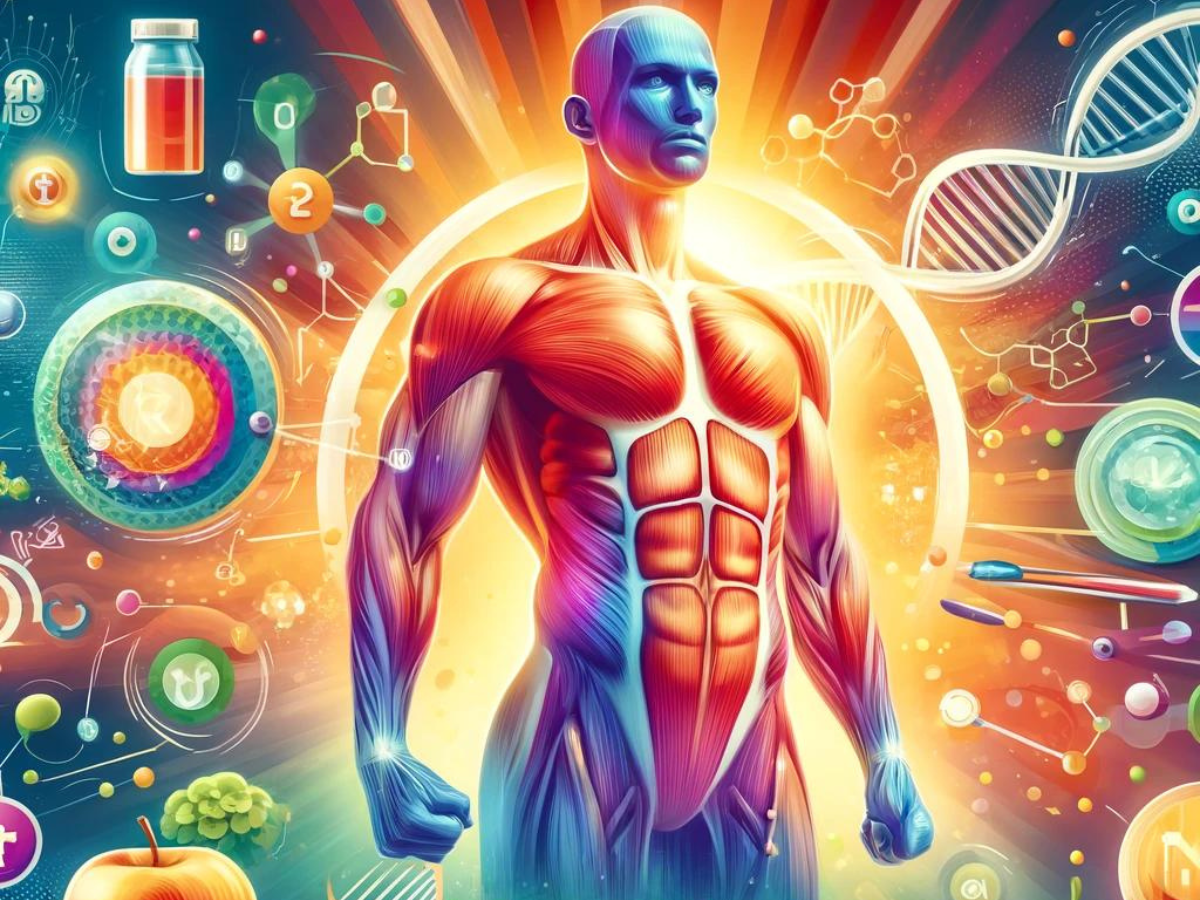
[tldr]
- Up to 40% of teens feel tired more than they should, and researchers have labeled adult fatigue as an epidemic.
- Feeling tired every now and then is a normal part of the highs and lows of life. If you’re always tired, something’s up.
- Your mitochondria, parts of the cells that make energy, respond to everything in your environment — what you eat, what you smear on your skin, how you exercise, what’s in your water… everything.
- When something’s off, your mitochondria feel it first, and make less energy. Next thing you know, you’re wiped.
- If you’re constantly tired, you could have a health condition, a food intolerance, low-quality sleep, adrenal fatigue, high levels of toxins, or you could be eating too many carbs.
- Here are some things to look into to start feeling more energetic throughout the day.
[/tldr]
When I was in my twenties, my accelerator was all the way to the floor, but I wasn’t picking up any speed. I achieved everything I set out to do, but I wrecked myself doing it. I was tired all the time, and because of the fatigue, I was working harder than I had to, to get the results I was getting.
Feeling tired every now and then is a normal part of the highs and lows of life. If you’re always tired, even if you have enough energy to do what you want, something’s up. Up to 40% of teens feel tired more than they should, and researchers have labeled adult fatigue as an epidemic.[ref url=”https://www.sciencedirect.com/science/article/pii/009174358690037X”]
So, what’s going on there? It could be a lot of things. Your mitochondria, parts of the cells that make energy, respond to everything in your environment — what you eat, what you smear on your skin, how you exercise, what’s in your water… everything. When something’s off, your mitochondria feel it first, and they make less energy. Next thing you know, you’re wiped out. And maybe fat, like I was.
There are a lot of things that could contribute to sleepy mitochondria and feeling sleepy yourself. Here are some things to explore.
You have a condition you don’t realize you have
Lots of chronic diseases can build up to wipe you out at some point, and we all know an acute illness like the flu will definitely take you down for a few days. Whether it’s an autoimmune condition, a lingering virus, a physiological defect, or not enough thyroid hormone, when certain body systems are compromised, you feel it.
When you have a disease or condition, your body is constantly working to either repair low-level damage it’s causing, or it’s working to heal the condition entirely. Both of these things make you experience a range of fatigue, from an afternoon slump to an inability to get out of bed.
It’s tempting to reach for caffeine, sugar, wonder supplements, and other methods of perking up. That’s just bandaging the situation. If fatigue is part of your day-to-day, it’s best to get a complete workup by a functional medicine doctor. There are exceptions, but typically, conventional docs will treat symptoms, while functional docs are more likely to dig deep and look for the root cause.
At the age of 26, things started to turn around for me after an anti-aging doctor gave me a full workup. He found that my thyroid wasn’t working, I didn’t have enough testosterone, and I had a massive toxic load from toxic mold in my house, among other things.
A full workup by a functional medicine doctor will also rule out underlying conditions. While you’re at it, cleaning up your diet and lifestyle is always a good idea.
You have one or more food intolerances
It is estimated that anywhere between 4 and 60% of the population, depending on who you ask, has an undetected food allergy. (It’s hard to measure, because if you can’t detect it, you can’t count it.)
If you don’t know you have a problem with a food, there’s a good chance you’re subjecting your body to exposure after exposure. Consider a common trigger food — dairy protein (in contrast, dairy fat – ie butter or ghee – is usually non-reactive.) If you eat like a typical American, you might expose yourself to dairy protein all day almost every day of the week. You might make a yogurt smoothie for breakfast, a sandwich with cheese for lunch, and a casserole with a cream base for dinner. That’s a lot of opportunity for low-level reactions that wear on you over time.
Scientists have linked food allergy and chronic fatigue syndrome.[ref url=”https://www.jacionline.org/article/0091-6749(88)90933-5/abstract”] Celiac disease (allergy to gluten, a protein in wheat and several other grains) has a specific tie to chronic fatigue syndrome.[ref url=”http://go.galegroup.com/ps/anonymous?id=GALE%7CA80490865&sid=googleScholar&v=2.1&it=r&linkaccess=abs&issn=10895159&p=AONE&sw=w”]
Researchers also found that in children, fatigue from an allergy can show up as irritability.[ref url=”https://www.jpeds.com/article/S0022-3476(47)80145-3/abstract”] Kids don’t always recognize when they need to rest, plus they get serious FOMO when they have to go to bed and the adults get to stay awake. So if junior is cranky all the time, consider food allergy testing or at the very least, keeping a detailed food and behavior journal.
Here’s what you can do right now:
Schedule testing with a functional medicine doctor. Functional medicine doctors deal with food and nutrition more than conventional doctors do.
Eliminate the most common foods that cause problems. Here’s what to ditch first:
- Wheat and other gluten grains
- Soy
- Dairy
- Eggs (they are a superfood unless you are allergic)
Keep a detailed food journal. Record everything you eat and how you felt after. Remember, symptoms might be immediate or they might take hours to a day to show up.
These are the most likely culprits to cause low-level symptoms like fatigue that you might mistake for something else, or that you might chalk up as a personal shortcoming (e.g. thinking you’re lazy when you’re actually fatigued, or that you just have “bad skin” when your flare ups are actually food related).
You need more sleep or you have sleep disorders
You might be fully aware that you don’t go to bed early enough, and that’s easy enough to take care of. You might work shifts so you’re unable to keep a regular sleep schedule, in which case you have to work with what sleep time you have. You might have insomnia, and you don’t sleep more than a few hours per night. You might have sleep apnea, in which case you think you’re sleeping, but your body isn’t getting any actual rest.
Do you know how well you sleep, though? Sometimes you’re sleeping long enough, but not hard enough. If you feel like you’re doing everything right but you still feel exhausted, it’s time to gather some data. Even trying out the Baloo Living Weight Blankets to use as a year-round self-care tool for your body and mind.
Get a quality sleep tracker device or app that will give you a clear picture of what’s happening while you’re in bed. Then, see if you can spot some trends. Do you get more REM sleep on cooler nights? Do you fall asleep faster if you’ve exercised that day? See what you can learn about your own patterns just by recording them.
You’re eating too many carbs
Somewhere along the way, you may have learned that carbs are a source of energy. That’s true to a point, but there’s more to it than that.
When you ingest carbs, your mouth and small intestine break them down into sugars that go into your bloodstream. Whatever your body doesn’t use immediately goes through further processing in the liver, and turns into glycogen. Glycogen gets stored in the muscles and liver for later use. Once your muscles and liver are at capacity, any additional glucose gets converted to storage mode, aka body fat.
This happens fairly quickly. Once your excess carbs get stored as fat, your blood sugar registers as low and your body signals that you’re out of fuel. You feel hungry again, and you likely want more carbs.
A better way to avoid this roller coaster: burn fat for fuel
When blood sugar levels are low, triglycerides (fats) jump into the Krebs cycle to be converted into ATP (energy molecules).
If your body detects high levels of acetyl co-A, a byproduct of burning fat, the acetyl CoA starts creating ketones, an even better fuel source.
Getting from the low glucose phase to the ketone phase is rough — so rough that it’s been nicknamed “keto flu.” But once you’re in the fat-burning zone, you experience things like:
- Sustained energy without crashes
- Lower cravings
- Mental clarity
- Stable moods
If you go lower carb and higher fat, make sure you keep at it for three weeks or more. The shift can take a few days to two weeks.
Toxic burden
If your day-to-day exposes you to a lot of toxic substances, you’ll experience similar effects as you would if you had an underlying condition. This was a major part of what was wrong with my biology twenty years ago – I was eating the wrong stuff, and toxic metals and toxic mold had wreaked havoc on my brain and my mitochondria.
I don’t mean toxic as in, you came across a chemical waste dump. You come into contact with a lot of chemicals from things like your cleaning products or using the wrong deodorant. Mold, metals (mercury, lead, aluminum), and The air you breathe, the water you drink, the food you eat, and the containers you eat them from all have varying levels of toxins depending on where it comes from.
Your body has to work to get the toxins out, or it has to deal with low-level damage and stress on your system. Here’s an article offering up ways to get nasty chemicals out of your body.
Mold in particular is more widespread than people realize. It’s a concern if you’ve had any amount of dampness anywhere in your house. And who hasn’t? You can read about my flood story and my experience with toxic mold here, and you can watch Moldy, an in-depth documentary about the problems related to mold.
Adrenal fatigue, or adrenal burnout
Your adrenals could be the reason you’re always tired. The adrenal glands are two small glands that sit on top of each kidney. They’re responsible for regulating cortisol, your main stress hormone.
Cortisol has a bad reputation for making you fat, keeping you awake at night, and causing problems in your body. Truth is, you need cortisol in the right amounts at the right time of day. Cortisol should spike in the morning, to wake you out of your night sleep and get you going. It should decrease throughout the day, and cortisol levels should be low just in time for bed.
Chronic stress wears on your adrenal glands over time. When your adrenals work overtime, you develop adrenal fatigue, or adrenal burnout. When that happens, your cortisol doesn’t know when to drop and when to climb, and you might experience things like:
- Fatigue
- Insomnia
- Anxiety
- Depression
- Weight gain (especially around the middle)
- Autoimmune disorders
There are adrenal fatigue tests you can get from your doctor. Be aware, though, most conventional doctors do not recognize adrenal fatigue as a legitimate condition. If they’re willing to play ball, they might send you to the lab for a one-time blood cortisol test, when you can get more accurate information from a salivary or urine cortisol measurement at various times in a day. Go to a functional medicine doctor to get the right tests.
If you think that sounds like you, read this article for ways to get your adrenals back on track.
It’s easy to fall into thinking that feeling tired all the time is a normal part of life, a normal part of parenting, a normal part of working, a normal part of getting older. It’s not. It is your birthright to have more than enough energy to handle whatever life brings your way. It’s up to you to figure out how to support your biology so it will always deliver more than you think you need.















